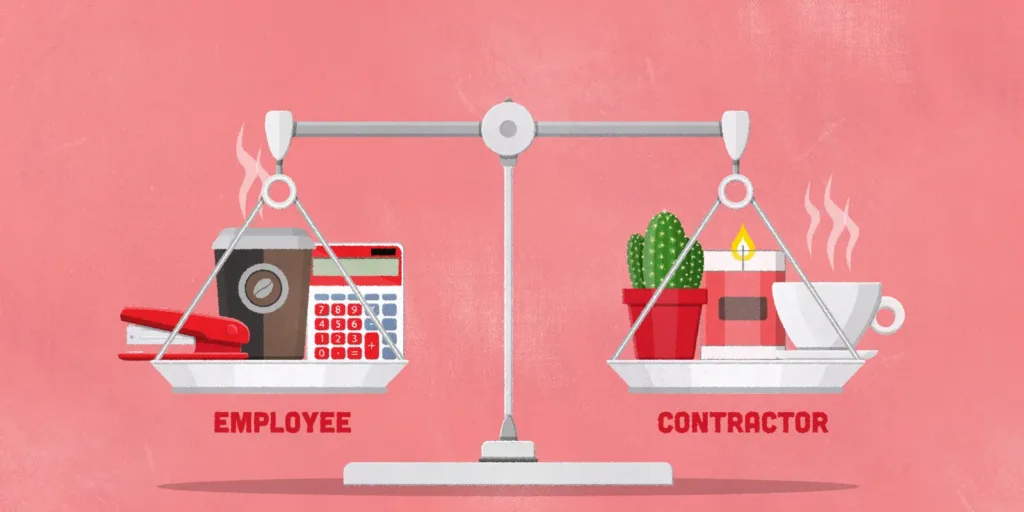There are distinct differences between independent contractors and employees, with the former having different legal entitlements. Employees have an exclusive working relationship with their employer and are governed under the Employment Act, whereas an independent contractor are not subject to the same statute and have different employment law protections. In Canada, companies may opt for an independent contractor as they are not responsible for their taxes, which are separate from the company’s business tax. Nonetheless, there are inherent risks with this type of employment. Fortunately, there are ways to mitigate these risks.
Compilation Engagements in Chatham >>

What are the Risks Associated with Hiring an Independent Contractor for Companies?
Hiring independent contractors instead of employees can provide various advantages to companies. However, this type of employment arrangement also exposes companies to financial risks, such as fines and penalties. Some companies may classify their employees as independent contractors to avoid certain business taxes or to shift the responsibility of paying independent contractor taxes to the contractors themselves.
In some cases, employees may not even be aware that they are not on a permanent contract basis and are instead hired as independent contractors. They may only find out about their status when their contract is terminated, and they are not entitled to any insurance benefits.
How to mitigate these risks?
Control
To avoid any issues with the PSB, you should take charge of your workers. Make sure to specify in their contracts whether they will work under your direct supervision, as this will create a clear distinction.
Bringing their own tools
If a company requires workers to provide their own equipment and software, they are likely hiring independent contractors rather than employees. Large-scale companies typically provide their own equipment, so if you are expected to bring your own tools, it’s likely that you are being hired on an independent contractual basis.
Risk of loss
If delivering a service could result in a financial risk, you are likely to be classified as an independent contractor, not an employee. Employees should not be expected to incur expenses while providing a service to the company, such as using their own car or phone. These expenses are reimbursed by the employer and help distinguish independent contractors from permanent employees.
Ability to earn a profit.
If there is an opportunity to earn a profit in addition to your salary, make sure to include this in your employer-employee contract. Clearly state that if certain milestones or targets are met, you are entitled to a reward or share in the profit.
Financial independence
If you work for more than one company and have multiple clients, you are considered an independent contractor. Make sure to clarify this arrangement to create a clear distinction and mitigate any risks.
Also Read: Deducting Mortgage Interest on Canadian Rental Properties
Is the company responsible for providing health insurance?
In Canada, there has been a growing trend of legal cases where plaintiffs argue that they were misclassified as independent contractors instead of employees. If a court finds in favor of the plaintiff, the company could be held responsible for contributing towards their health insurance and pension plan, as well as potential damages.
What are the risks of working as an independent contractor for businesses?
In Canada, authorities are vigilant about companies that may be misclassifying workers as independent contractors and may impose severe fines and sanctions. If caught, a company may be required to make backdated payments, pay interest on those payments, damages, and fines, and may even face public scrutiny. Canada has strict rules against misclassification, and the burden of proof lies with the employer to prove that a worker is an independent contractor, rather than with the employee.

Is it necessary to create a contract when hiring an independent contractor?
Yes, it is essential to have a clear contract that specifies whether the worker is being hired as an independent contractor, who is responsible for paying independent contractor taxes, or as an employee, for whom the company is responsible for paying business taxes. Failing to make this distinction can lead to confusion and potential legal issues. It is advisable to clarify this distinction upfront to avoid any misunderstandings. In case of any legal issues, if the company is unable to prove the worker’s status, it can face significant losses.
Also Read: Guide to Filing Tax Returns as a Couple in Canada
Obtaining a Master Business License in Ontario
Are you eager to start your own business venture in Canada? Do you have an innovative business concept in mind? If so, it’s worth considering applying for a master’s Business License. This license is essential for anyone looking to launch a business in Ontario, and it ensures that your company is established efficiently and effectively.
With a master’s Business License, you’ll be able to legally use your chosen business name and enjoy additional benefits as a business owner. Whether you’re planning to set up a sole proprietorship, general partnership, or trade name, this license can help you register your business under the Business Names Act. Keep in mind that any company you see advertised on TV, billboards, or online has likely obtained this master Business License before launching their business.
What a master business license is?
Essentially, it’s a document that contains important details about your business such as its name, address, business number, and a brief overview of what it does. Additionally, it specifies the type of company you have – whether it’s a sole trader, sole proprietorship, partnership, limited liability, or tradename.
In conclusion,
Independent contractors are a popular choice for small businesses in Canada due to favorable tax benefits. However, there are potential risks involved if employers misclassify their workers as independent contractors solely to reduce costs and obligations. It’s important to ensure that the worker’s status is properly determined to avoid any legal and financial consequences.
Recent Posts
FAQ
What are the factors that determine the type of relationship between an employee and a company?
Several factors can determine whether an individual is considered an employee or an independent contractor. These include ownership of the tools used, the assumption of risk, opportunities for profit, and the level of control exerted by the company over the individual.
What are some ways for a company to avoid penalties resulting from contracting?
One way to avoid penalties is to include a provision in the contract that allows the company to hire sub-contractors to assist with completing tasks. Additionally, if there are concerns about hiring an independent contractor, the company can consider hiring a permanent employee to handle functions such as accounting, bookkeeping, and record-keeping to avoid potential issues.



